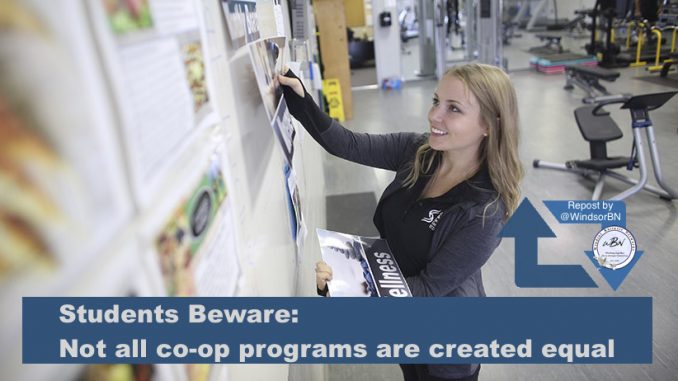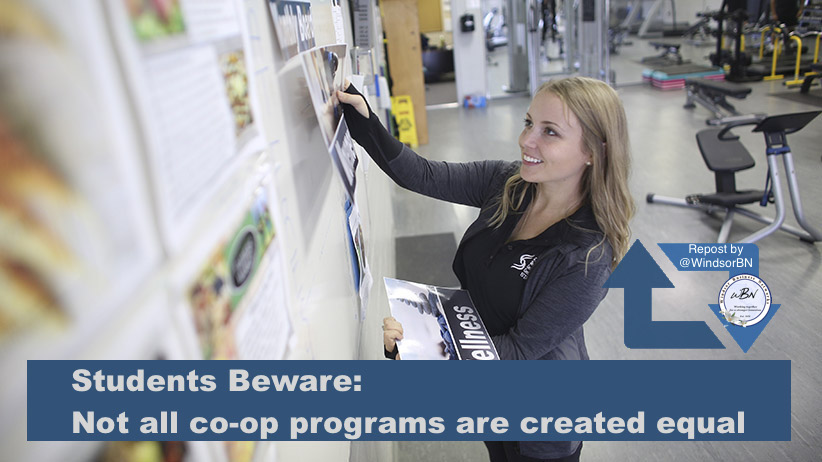
Get a jump on the job market by enrolling in a co-op program, but do your research first

Undeterred by the extra year it will take to graduate, business student Jessica Peakman is interspersing work terms with her academic studies at University of the Fraser Valley (UFV) in British Columbia. “I figure it’s worth it, right?”
As one of more than 80,000 Canadian university and college students enrolled in co-operative education programs, Peakman feels the work experience will enhance her book smarts and, ultimately, lead to more rewarding career prospects.
“I decided to go into it because there were students who couldn’t find jobs after graduation. I wanted to avoid that,” says Peakman, who is currently working, between her second and third academic years, as a career development and events assistant in UFV’s career centre. One of her final work-term undertakings will be to organize a career fair.
“I knew it would be a great opportunity. A lot of students don’t like doing co-op because it makes their studies longer.” To Peakman, it makes sense to gain some work experience as an undergrad with employers committed to training her.
“The co-op employers are a little bit more forgiving. They understand that you are a student, so they are open to people who don’t have a lot of experience. That stood out to me.”
Ideally, that’s what co-op education should be all about. But how can students assess the educational quality of the programs they are considering? While many post-secondary institutions have well-developed co-op programs and adhere to rigorous standards established by the Canadian Association for Co-operative Education (CAFCE), others are newer to the game.
Under pressure from governments and employers to produce “job ready” graduates, “every place out there now is going to be slapping together work-integrated learning programs, calling it experiential learning and promoting that to students,” says Harvey Weingarten, president and CEO of the Higher Education Quality Council of Ontario. “We’re going to see a proliferation of these. That’s not a bad thing, but evaluation of which of those work and which of those are not working is important,” says Weingarten.
“If I were a student contemplating a co-op program, here’s what I would want to know: Show me a list of the employers I might be placed with; tell me something about what things I will be asked to do for those employers. How much does the institution actually monitor what’s going on in the co-op program? And tell me about the employment success of students who have gone through this.”
While many colleges and universities post this information on their websites, many don’t. It’s worth a look, Weingarten says. “Lots of students tell stories of placements where they did all these interesting things, and others will tell you, ‘I filled out forms all day or I spent my day photocopying and getting coffee for the boss.’ ”
Peakman concurs: “You don’t want it to be a position where they are just doing basic office tasks, because they could get that experience without a degree.”
Amanda McManus, a graduate of the health, wellness and fitness co-op program at Mohawk College in Hamilton, is one of those success stories. During her year-long work term at steelmaker ArcelorMittal, McManus researched and developed an exercise program based on the World Health Organization’s dimensions of wellness initiative to promote mental health.
And when McManus returned to the Mohawk campus for her final academic semester, she took lessons from the workplace back with her. “We even had a class in fourth semester called employee wellness . . . a lot of people didn’t know what an EAP [employee assistance plan] was, so I was really able to help with that,” says McManus, who landed a job at ArcelorMittal’s recreation and learning centre in Stoney Creek, Ont., after graduating this year.
Hallmarks of a good co-op program initiatives
Accreditation by the Canadian Association for Co-Operative Education (member institutions are listed at cafce.ca) indicates a degree of quality control, says Jasminn Berteotti, CAFCE president and acting director of arts and science co-operative education and applied studies at the University of Lethbridge.
Colleges and universities that have been accredited by CAFCE, or adhere to its standards, are expected to screen employers for their suitability and commitment to the students’ professional development before approving a placement.
Co-op coordinators have an obligation to keep tabs on students during their work terms, which under CAFCE criteria must amount to at least 30 per cent of the time they spend on academics. “You can’t just drop them in and say, ‘good luck,’ ” Berteotti says.
Co-op students should be engaged in productive work, rather than merely observing. And they must be paid. A properly structured post-secondary co-op program is not a source of free labour.
“One of the key components is to make sure they are meaningful opportunities” related to the student’s field of study, she says.
“There are limits to what you can learn from a textbook. Co-op students have the opportunity to really apply that knowledge in a practical way.”
For instance, a student from the University of Lethbridge’s neuroscience program was engaged in concussion research during a recent co-op work term with the Department of National Defence. The work she was doing “was mind-blowing.”
Prep time is important. Students should attend pre-employment classes before applying for a placement, not only for pointers on how to write resumés and cover letters, but also to learn about professionalism and work ethics, says Michael Baumann, career centre director at University of the Fraser Valley. You want to avoid the situation of a student declaring during a job interview that he will not start before 10 a.m. because he is “not really a morning person,” Baumann says.
Once students have made a commitment to an employer, they are expected to stick with it, but the co-op coordinator should monitor the job site and the work in progress, says Trent Jarvis, a co-operative education specialist and member of the board of governors at Mohawk College. “We keep in touch with the employer to ensure that it’s a quality experience and, if it’s not, we will do our best to switch it up to make it valuable to the students,” Jarvis says.
Tips from the trenches
Apply early, apply often: Landing a co-op placement can be extremely competitive, says University of the Fraser Valley (UFV) business student Jessica Peakman, who applied to 10 co-op positions before securing her work term in the university’s career centre. “I only had one other interview.”
Apply even if it doesn’t seem like the perfect fit: Amanda McManus of Mohawk College talked about her interest in mental health during her interview for a co-op work term in ArcelorMittal’s fitness centre. “Someone else got that fitness centre job, and they created a new position for me . . . because they were trying to launch a lot of their own mental health initiatives,” McManus says.
You are there to learn: “We have had students tell us they do not want to work in an entry-level job,” Michael Baumann, career centre director at UFV says. “We try to educate the students as to what the [co-op] job will be. You will not go in as a supervisor.”
Be open to new adventures: A connected co-op coordinator can often find an opportunity, even in fields such as theatre, where jobs are not so plentiful. Baumann has placed theatre students at the Fort Langley National Historical Site in British Columbia, where they were hired to do re-enactments. “You never know who needs your skills.”
